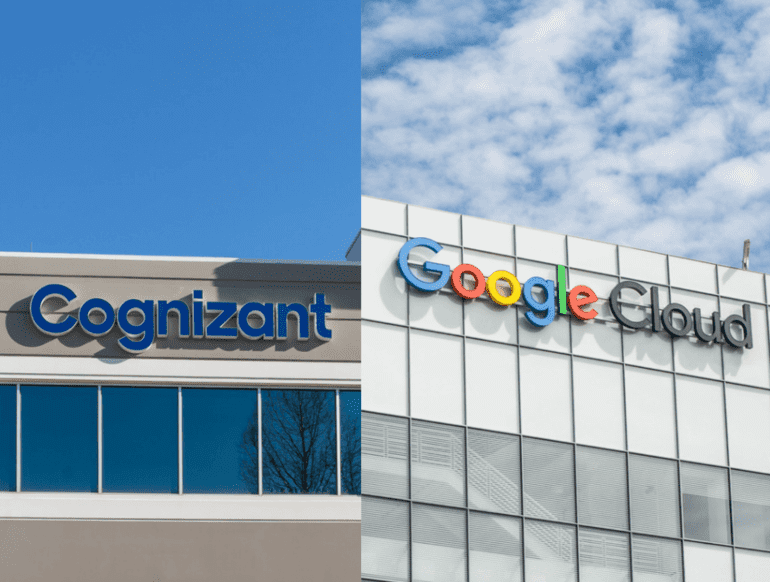- Cognizant and Google Cloud have expanded their partnership to enhance software delivery and developer productivity.
- Cognizant will integrate Google Cloud’s Gemini for software development, aiming to accelerate code writing, testing, and deployment through AI-powered tools.
- The collaboration is backed by findings indicating generative AI could inject $1 trillion into the U.S. economy by 2032.
- Cognizant plans to upskill over 70,000 associates on Google Cloud’s AI offerings and integrate Gemini into its automated platforms.
- Expected benefits include streamlined incident analysis, AI-driven chat capabilities, and enhanced user experiences.
- Cognizant will establish Gemini Studios and Centers of Excellence to foster AI innovation globally.
- Google Cloud will support Cognizant in developing AI-led software engineering best practices and launching advanced AI courses.
Main AI News:
In a strategic move aimed at bolstering software development productivity, Cognizant and Google Cloud have unveiled an expansion of their collaborative efforts. The partnership seeks to optimize the software delivery lifecycle while propelling developer efficiency to new heights.
Cognizant is set to integrate Gemini for Google Cloud in two primary ways. Firstly, the company will impart training to its associates, equipping them with the prowess to leverage Gemini for software development support. Secondly, Cognizant will seamlessly embed Gemini’s advanced capabilities into its internal operations and platforms. This strategic alignment will empower Cognizant’s developers to expedite the writing, testing, and deployment of code, leveraging AI-powered tools to enhance reliability and cost efficiency across client applications.
The potential ramifications of heightened development productivity are illuminated by insights from a recent joint study by Cognizant and Oxford Economics titled “New Work, New World.” The study posits that generative AI could inject up to $1 trillion into the U.S. economy by 2032. Through this collaborative endeavor, Cognizant and Google Cloud aim to harness the capabilities of Gemini to deliver a myriad of benefits to enterprise clients across diverse industries. These benefits include accelerated application development, rigorous code testing, and expedited issue remediation, thereby optimizing performance throughout the software delivery lifecycle.
Ravi Kumar S, CEO of Cognizant, remarked, “Software development stands to reap substantial benefits from the transformative potential of generative AI in reshaping the landscape of work. Cognizant’s commitment to investing $1 billion in generative AI over three years underscores our belief in its capacity to augment human potential. Our partnership with Google Cloud is pivotal in this commitment and in realizing our vision.”
Over the next year, aligned with its Synapse initiative to upskill one million individuals globally by 2026, Cognizant will allocate resources to train over 70,000 associates across various functions on Google Cloud’s AI offerings. Additionally, Cognizant will endeavor to seamlessly integrate Gemini into its suite of automated platforms and accelerators, commencing with the recently unveiled Cognizant Flowsource™️ platform for developers.
Thomas Kurian, CEO of Google Cloud, emphasized, “Generative AI holds immense promise in enhancing every facet of the software delivery lifecycle, facilitating rapid code generation, issue troubleshooting, and process automation. By empowering its workforce with training on Gemini for Google Cloud, Cognizant can expedite the pace and quality of software development endeavors for mutual clients.”
The infusion of generative AI capabilities into Cognizant’s proprietary internal operations and platforms is poised to engender deeper insights, streamlined processes, and enriched user experiences, all while prioritizing security and responsibility. Anticipated benefits include heightened incident analysis capabilities, AI-driven chat functionalities within Cognizant Flowsource, and an enhanced user experience leveraging Gemini’s natural language interface.
In alignment with its strategic focus on cultivating deep AI-related expertise, Cognizant will establish Gemini Studios within each of its Cloud AI Innovation hubs across key global locations. These studios will serve as incubators for the ideation, architecture, and scaling of AI solutions for enterprise customers. Furthermore, Cognizant will establish Gemini Centers of Excellence within its dedicated Google Cloud delivery centers, fostering innovation and customer success with generative AI solutions.
Google Cloud’s support will extend to aiding Cognizant in the ongoing development of AI-led software engineering best practices. Additionally, the collaboration will see the launch of advanced courses on AI use cases through the Cognizant Google Cloud AI University.
As a testament to their robust partnership, Cognizant serves as a global systems integrator partner for Google Cloud and holds the esteemed title of Luminary Sponsor for the Google Cloud Next ’24 conference. The alliance, initially announced in May 2023, has since been expanded to include the development of healthcare-focused large language model solutions, further harnessing the potential of generative AI to address complex healthcare challenges.
Conclusion:
The deepening collaboration between Cognizant and Google Cloud to leverage generative AI for software development signifies a significant stride towards optimizing efficiency and productivity in the market. This strategic alliance not only underscores the transformative potential of AI but also sets a precedent for future partnerships aimed at harnessing advanced technologies to drive innovation and deliver enhanced value to clients across industries. As businesses increasingly prioritize digital transformation and seek to capitalize on AI-driven solutions, this partnership sets a compelling example of how strategic collaborations can fuel market growth and competitiveness.

